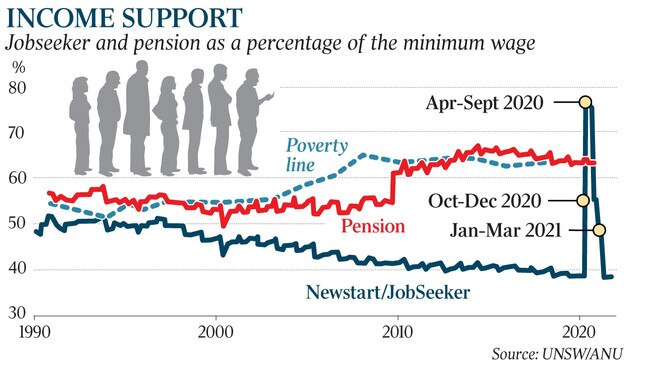JobSeeker benefit ‘not slowing job hunt’
The additional JobSeeker benefit has not been a disincentive for people to look for a job and should not be lowered to pre-COVID levels, labour market experts say.
The additional JobSeeker benefit has not been a disincentive for people to look for a job and should not be lowered to pre-COVID levels, labour market experts say.
In evidence to a Senate inquiry examining the Coronavirus Supplement, Australian National University professor Peter Whiteford said the current JobSeeker payment, in effect to the end of the year, was currently about 55 per cent of the minimum wage, meaning there was still a significant incentive to find work.
Even if JobSeeker were increased to the level of the Age Pension, as he believed it should be, there would still be sufficient incentive for people to chase work rather than accept the welfare payment, he said.
“(In that case) you’d be getting about 65 per cent of the minimum wage, so you’d still be increasing your income by more than half by getting a job. People would be much better off,” Professor Whiteford said.
He noted that before the pandemic the gap between the minimum wage and the unemployment benefit in Australia was the highest in the OECD, and even when the supplement was at its highest Australia was still slightly below average.
“So there‘s a very large gap between what people receive on payments and what they will receive in paid work, and at the moment I think there is no reason to think this is necessary in order to incentivise people to actively look for work.”
The federal government introduced the $550 per fortnight Coronavirus Supplement at the start of the pandemic for a range of welfare recipients, including the jobless and single parents. This almost doubled the previous Newstart Allowance.

As the pandemic eased, the supplement was reduced to its current $250 per fortnight, and will be further reduced to $150 between January and March.
What happens after March remains unclear, with welfare groups arguing a return to the old rate, about $40 a day, would significantly harm the nation’s neediest.
The business community is divided, with the Business Council of Australia agreeing the rate should be closer to the Age Pension while the Australian Industry Group suggested other supports could be boosted rather than risking a loss of incentive to work.
The government is yet to tip its hand but has said the payment should not reduce the incentive for people to work.
Melbourne University professor Jeff Borland told the committee there was no evidence, even when JobSeeker was at its highest level, that there had been any impact on people looking to take up paid work. “I‘m not aware of systematic Australia-wide evidence that the COVID-19 supplement has constituted a barrier to people moving back into work,” Professor Borland said.
Anglicare Australia executive director Kasy Chambers told the Senate committee that abandoning the supplement would be “condemning more than a million children back into poverty”.



